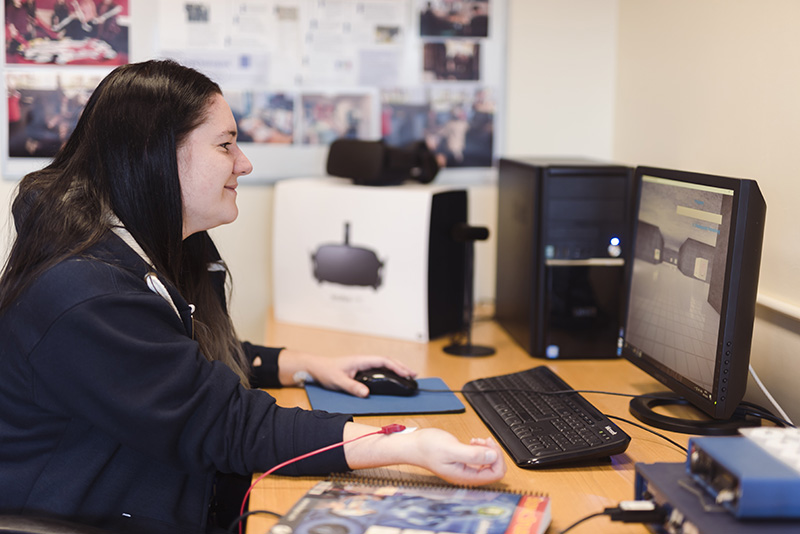BSc (Hons) Psychology

Course details
UCAS Code
C800
Year of entry
2024, 2025
Duration
3 YRS (FT) 6 YRS (PT)
UCAS Tariff
80-112
Institution Code
G53
Location
Wrexham
Course Highlights
Accredited
by the British Psychological Society (BPS)
Top 3 in the UK
and 1st out of Welsh universities for the teaching on my course & top 10 in the UK for overall satisfaction (National Student Survey 2022)*
1st in the UK
for Teaching Quality and 3rd in the UK, 1st in Wales for Student experience (The Times & The Sunday Times Good University Guide 2023)*
Why choose? this course?
If you are fascinated with behaviour and wonder why people do what they do, then our psychology course – which is accredited by the British Psychological Society (BPS) – will be ideal for your questioning mind.
On this course you will:
- have the opportunity to research a topic of your own choosing for your dissertation in the final year
- have access to support throughout your degree from award-winning personal tutors, fantastic psychology technicians and module leaders who are happy to arrange additional module tutorials on request
- complete assessments that measure your understanding and critical thinking about psychology, as well as encourage the application of theory to ‘real world’ problems
- have access to a diverse range of facilities including our psychometric lab, flight simulator, high-tech sports performance lab, experimental cubicles and simulation lab
- study core modules relating to social psychology, individual differences, cognitive psychology and psychobiology, which will enable you to gain a greater understanding of social interaction, individual development, and the way in which the brain interprets information
- over the course of the degree be taught the skills needed to conduct research using both qualitative and quantitative methods.
- gain transferrable skills that are desirable by employers
- be part of small yet diverse class size
- *This course has been ranked 1st in the UK as part of the Psychology subject league table for Teaching Quality as well as 3rd in the UK and 1st in Wales for Student experience in The Times and The Sunday Times Good University Guide 2023.


Psychologyat Wrexham University
Discover more about studying Psychology at Wrexham University from our staff and students.
Key course features
- Accredited by the British Psychological Society (BPS) – you will also have the opportunity to attend and present at the BPS conference in your final year
- Small and friendly department with a research-active academic team; who are fully supportive of student research interests. This includes supporting students in their final year to pursue their own research ideas in the form of an individual research project, which is supported and guided by their supervisor; this forms the final year dissertation.
- Opportunities within each module for students to gain hands-on experience of the applicability of theory and/or develop student research skills. We believe that psychology is about real life and formal lectures should be enhanced by experiential learning. Psychology is an applied science, and we believe that it is important that students can apply theory in a practical way.
- Take part in our Annual Psychology Enrichment Week, which was commended by the BPS: “The enrichment week is an opportunity for students and staff to provide approachable networking opportunities and assists to develop a broad range of skills including presentation skills which is fundamental in developing psychological literacy. These skills are essential transferable skills that students were able to use reflecting upon their academic and personal experiences.”
- Dedicated research methods modules which focus on quantitative and qualitative methodologies equally
- Be given the opportunity to take part in our annual real-time Crime Scene Day learning simulation – where students from different departments come together to act out, witness, investigate and report on a high-profile crime that has taken place on campus.
- We now embed both qualitative and quantitative approaches throughout all of the research methods modules at levels 4, 5 and 6.
What you will study
YEAR 1 (LEVEL 4)
Over the course of your first year, you will develop study and research methods skills that are key to the Psychology degree, whilst also learning and developing your understanding of key psychological theories and concepts.
MODULES
- Concepts and debates in psychology (core)- This module will introduce you to the conceptual and historical issues presented across the key topics in Psychology. Students will receive an overview of competing and evolving theoretical perspectives to provide a foundational understanding of approaches to the discipline from its conceptualisation to the modern-day application.
- Study skills (core)- This module will develop the skills necessary for you to study Psychology in a higher education environment. You will develop both general, and subject specific skills including essay writing, research report writing, digital literacy skills, presentation skills, and APA formatting. The module will also allow you to develop strategies for approaching a range of assignments.
- Research methods 1 (core)- This module will introduce you to the nature, philosophy, and scope of research methods in psychology. You will gain an appreciation for the different philosophical positions that underpin research, as well as the fundamentals and principles of different approaches, covering both qualitative and quantitative methodologies. The module will give you a basic knowledge of the research process, research methods, the importance of ethics, and current debates within research.
- Biological development (core)- Within this module, you will develop knowledge of biological development throughout the lifespan. You will gain an understanding of the structure and function of cells, genes, and chromosomes, along with how they are important for psychological functioning. You will also gain an understanding of the biological changes that occur at key developmental periods, including childhood, adolescence, and older adulthood.
- Social development (core)- This module will introduce you to psychological concepts, theories, and methods relevant to social development. Within this module you will lean about topics such as attachment, moral development, theory of mind, attribution, social perception, prosocial behaviour, and social influence from both a developmental and social perspective.
- Research methods 2 (core)- Within this module you will build on the knowledge you have acquired in research methods 1. The module will allow you to develop an appreciation for different approaches to data analysis, considering both qualitative and quantitative methodologies. You will also acquire a basic level of knowledge and understanding of the data analysis process including an appreciation of the strengths and limitations of these approaches. This module will allow you to develop your practical research skills through conducting a piece of research.
YEAR 2 (LEVEL 5)
In your second year, you will continue to develop your research method skills and apply them in different areas of Psychology. During this year you will complete some core modules that will build on the knowledge gained in the first year.
MODULES
- Cognitive and behavioural neuroscience (core)- In this module you will be introduced to classic and current theories relating to neuroscience. You will also develop critical evaluation skills relating to these theories. You will gain knowledge of a range of areas in cognitive and behavioural neuroscience, including physiology of the central nervous system, sleep and biological rhythms, and pharmacology. You will also learn about neuroscientific techniques used for research and assessment.
- Memory and language (core)- This module will introduce you to classic and current theories relating to attention, learning, memory, and language. You will also develop critical evaluation skills related to these theories and their evidence base. You will learn about how different experiments and assessments may be used to evaluate cognitive processes alongside neuroscientific techniques used for research and assessment.
- Research methods 3 (core)- Within this module you will build on the knowledge and understanding you have acquired in research methods 1 and 2. You will gain a working knowledge of qualitative and quantitative methodologies for data analysis, along with developing an appreciation of the strengths and limitations of different approaches. You will also gain practical data analysis skills and develop confidence in selecting the appropriate analytical method for the research question. Within this module you will develop a research proposal which will inform your dissertation research project.
- Personality and individual differences (core)- This module will encourage you to examine the concepts of personality and intelligence (including emotional intelligence). You will be able to develop an appreciation of the ways in which these concepts influence the behaviour of the individual in everyday life. The module will also allow you to gain an in-depth understanding of psychometric tests employed in the field.
- Social behaviour and interaction (core)- This module will develop your critical understanding of psychological theories related to behaviours and interactions within a social world. It will also equip you with and understanding of the interface between individual, interpersonal, and group behaviours and interactions in a variety of social contexts.
- The self (core)- Within this module you will develop a critical understanding of psychological concepts and theories related to development of self. You will also explore the interface between the self and social interactions and develop an understanding of the self as an integrated subject.
YEAR 3 (LEVEL 6)
In your final year, you will design your own research project with supervision from the Academic team. This year will see you complete the final core module, Social Psychology, and also allow you to choose optional modules to study based on your own preferences and interests.
MODULES
- Research methods 4 (core)- This module will build on prior research methods modules covered at level 4 and 5. You will further develop your knowledge of approaches to data analysis, and further develop confidence in selecting the most appropriate method for the research question posed. Within this module you will also build your critical analysis skills in relation to the philosophical underpinnings of research methods, along with different methodologies and methods used.
- Research project (core)- Utilising your theoretical and research knowledge obtained in level 4 and 5, you will carry out your own research project. You will plan your research, undertake data collection, and write up your research project. You will also disseminate your research in an oral assessment.
Students will take three optional modules:
- Forensic psychology (optional)- Within this module you will critically discuss and apply psychological theories and research in forensic psychology. You will learn about different areas of forensic psychology including theories of crime, terrorism, mental health and crime, offender profiling and eyewitness testimony. You will also learn about forensic psychology as a profession, and the psychology of the courtroom.
- Clinical and health psychology (optional)- Within this module you will develop a critical understanding of the role of social, psychological, and biological factors on physical and psychological health. This will include topics such as health inequalities, health promotion and behaviour change, pain and pain management, psychopathology, and assessment and formulation. You will also learn about clinical and health psychology as a profession.
- Cyberpsychology (optional)- This module will equip you with an understanding of the psychological processes, motivations, intentions, behavioural outcomes, and consequences of any form of technology use. You will develop an understanding of the relevant psychological theories associated with positive and negative aspects of online behaviour.
- Counselling psychology (optional)- In this module you will be introduced to the role of counselling psychology. You will learn about different theoretical models and approaches used within counselling psychology, along with future directions for the profession. You will also increase your knowledge of ethical issues which may arise within counselling psychology and explore the role of personal and professional development.
- Neuropsychology (optional)- Within this module you will learn about the neuroanatomy of neuropsychological disorders, neuropsychological assessments, and interventions. You will be able to understand the role of neuropsychological assessment, and critically consider interpretation of assessment data. You will also explore the role of individual differences in neuropsychology, along with ethical considerations that my arise.
- Developmental disorders (optional)- This module will provide you with an understanding of the different developmental disorders and their progression throughout the lifespan. You will also gain an understanding of the different interventions which may be utilised for management of disorders, and how they may influence their outcome. You will also be encouraged to critically consider different social, cultural, and economic factors and how they may influence outcomes of developmental disorders.
- Negotiated learning (optional)- This module is student-led, and therefore you will negotiate learning which is essential for your personal and/or professional development. Within this module you will guide your own topic area to critically evaluate the principles, theories, and research that underpin a particular area of psychology.
- Work-based learning (optional)- If you choose this module, you will make contacts and engage with relevant organisations and practitioners in the field of psychology. You will critically investigate and apply psychological knowledge to a work environment and develop insight and direct experience of professional psychology in preparation for working within psychological settings.
The information listed in this section is an overview of the academic content of the programme that will take the form of either core or option modules. Modules are designated as core or option in accordance with professional body requirements and internal academic framework review, so may be subject to change.
Entry requirements & applying
The academic requirements for the course are 80-112 UCAS tariff points at GCE A-level or equivalent and a GCSE at grade C/4 or equivalent in Maths and English/Welsh (First Language). Appropriate AS-Level and Level 3 Key Skills qualifications will also be taken into account. A science would be an advantage but is not essential.
Applications are welcome from anyone who exhibits the ability and experience to cope with the demands of the programme. There are arrangements in place for accrediting prior experience: entry to the degree is possible under the accreditation of prior and/or experiential learning.
A Disclosure and Barring Service (DBS) clearance (previously known as CRB) may be required for placement activity on optional Work-Based Learning modules.
Teaching & Assessment
You will be assessed via a variety of different assessment methods, including a combination of coursework, essays, portfolios, practical reports, presentations and in-class tests. The course does not currently assess you via exams. You will be required to do a dissertation as part of your final year assessment.
Teaching and learning
Wrexham University is committed to supporting our students to maximise their academic potential.
We offer workshops and support sessions in areas such as academic writing, effective note-making and preparing for assignments. Students can book appointments with academic skills tutors dedicated to helping deal with the practicalities of university work. Our student support section has more information on the help available.
In terms of particular needs, the University’s Inclusion team can provide appropriate guidance and support should any students require reasonable adjustments to be made because of a recognised prevailing disability, medical condition, or specific learning difference.
The degree will be taught through a combination of lectures, seminars, tutorials, practical classes, project work and computer-based exercises (e.g. in research methods and statistics). Teaching currently takes place over the course of 3 days a week and contact hours vary year to year, as you become an independent learner (Foundation year 40 hours; Year 1 36 hours; Year 2 30 hours; Year 3 24 hours).
Career prospects
As a BPS accredited degree, this course will help to acquire transferrable skills including critical reasoning, quantitative and qualitative competency, and a deep understanding of scientific practice. Alongside developing both essential and more specialist psychological knowledge across a broad range of disciplines, this degree can also lead to a variety of career opportunities including:
- Academic teaching and research
- Forensic psychologist
- Educational psychologist
- Clinical psychologist
- Sports psychologist
- Human resources
- Counselling
- Teaching
- Occupational psychologist
Our graduates have previously secured employment and successful careers as an assistant psychologist (CAPs), drug and alcohol practitioner, mental health and wellbeing transition officer, residential support worker, project worker (Barnardo’s), and with the police force.
Our optional work-based Learning module provides students with an opportunity to build on their practical experience and gain vocational employability skills.
Our Careers and Employability Service is there to help you make decisions and plan the next steps towards a bright future. From finding work or further study to working out your interests, skills and aspirations, they can provide you with the expert information, advice and guidance you need.
Fees & funding
You do not have to pay your tuition fees upfront.
The fees you pay and the support available will depend on a number of different factors. Full information can be found on our fees & finance pages. You will also find information about what your fees include in the fee FAQs.
All fees are subject to any changes in government policy, view our undergraduate fees.
Programme specification
Accommodation
If you’re looking for a place to stay while you study then take a look at our accommodation pages to get more information on your options, including our on-campus halls of residence Wrexham Village.
International
If you are applying as an European / International Student, and live outside of the UK, you should make your application through our online application system, Centurus.
For information about the university’s entry requirements for EU/international students, please visit our international section.

Take part in our annual real-time training exercise
A high-profile Crime Scene Day learning simulation is held each year, with students from a range of courses acting out, witnessing, investigating and reporting on a high-profile crime on campus

